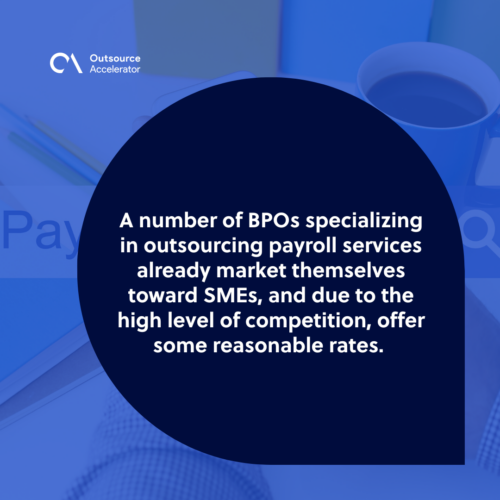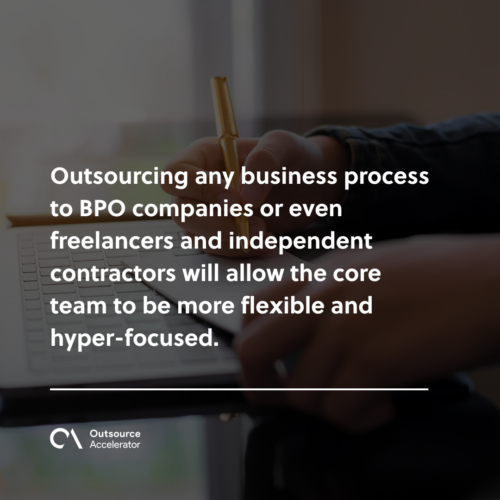Typical cost of outsourcing payroll: How much should you spend?

- Typical cost of outsourcing payroll
A number of BPOs specializing in outsourcing payroll services already market themselves toward SMEs and due to the high level of competition, offer some reasonable rates.
Prices can range from around US$20 to $250 per month, but what is common all throughout is that the pricing model typically charges per employee or per check on top of the base accounting fee.
The company should then conscientiously monitor all the additional costs that may add up, such as for auxiliary services and for each new employee that the company might gain in the future.
That said, several things can determine the basic cost of outsourcing your payroll.
Among the primary factors are:
- The total number of employees in the company
- How often the employees are paid (be it once a month or twice a month)
- How many employees reside in more than one state
- The need to do direct deposit; and
- Any additional tax filing services your company needs.
Off the bat, it is wise to ask for a price quote from your potential services provider.
They should be able to offer you a project proposal that caters to the size of your company and your price point. From this initial contact, you will also be able to gauge their level of knowledge about your industry, state and federal tax laws, and the like.

How payroll pricing is structured
Even though there are many ways payroll companies charge clients for their services, there are some common approaches:
Per frequency
One common method for payroll outsourcing costs is per frequency. This pricing model charges businesses based on how often they run their payroll.
For example, if a company processes payroll biweekly, they would pay a set fee for each biweekly payroll run. This approach offers flexibility for firms with varying payroll needs.
Per employee per month (PEPM)
Another widely used pricing structure is per employee per month (PEPM). Under this model, companies are billed a fixed amount for the number of employees on their monthly payroll.
For instance, a business with 50 employees would pay a set fee multiplied by 50 for their monthly payroll services.
PEPM pricing simplifies budgeting and is often preferred by businesses with stable headcounts.
Fixed pricing
Fixed pricing is a straightforward approach where companies pay a predetermined, flat fee for their payroll services, regardless of frequency or the number of employees.
This payroll outsourcing cost model offers predictability in expenses, making it easier for businesses to plan their budgets. It’s especially beneficial for small businesses with limited resources who want to save money.
Salary comparison for payroll services professionals
To give you an idea of how much a business saves by outsourcing payroll, here’s a look at how much average payroll services professionals in the Philippines, US, Canada, and Australia earn every year:
| Job Title | Annual PH Salary in USD | Annual US Salary in USD | Annual CA Salary in USD | Annual AUS Salary in USD | Annual UK Salary in USD |
| Human Resource Assistant | $ 3,254 | $ 39,124 | $ 29,685 | $ 34,027 | $ 26,428 |
| Human Resource Manager | $ 9,069 | $ 64,476 | $ 59,778 | $ 62,690 | $ 46,398 |
| Payroll Analyst | $ 5,664 | $ 55,184 | $ 42,801 | $ 62,808 | $ 45,503 |
| Payroll Manager | $ 13,321 | $ 64,035 | $ 51,870 | $ 72,517 | $ 40,338 |
| Payroll Specialist | $ 5,482 | $ 46,858 | $ 41,221 | $ 59,707 | $ 35,703 |
| Payroll Supervisor | $ 7,900 | $ 58,764 | $ 52,338 | $ 60,040 | $ 34,246 |
| 1 USD=53.44 PHP | 1 USD=1.31 CAD | 1 USD=1.35 AUD | 1 USD=0.76 GBP |
Companies stand to maximize their savings should they choose to outsource to countries with a lower cost of labor than their own.
Payroll service providers operating in the Philippines may be expected to offer more affordable rates compared to companies based in Australia, Canada, and the US due to the lower labor cost and cost of living.
At the same time, Philippine-based companies have easy access to a well-educated workforce — and outsourcing payroll professionals.
Alongside a pool of experienced experts that are quite familiar with various outsourcing payroll standards and systems too.
This means that their clients can expect high-quality service for a fraction of the original cost.
That being said, outsourcing payroll and HR activities will pay off in the long run. There’s no doubt that outsourcing is a costly and tedious process but when done right, its benefits and advantages will shine through in time.
Factors that drive up outsourcing payroll prices
Payroll outsourcing can bring efficiency and accuracy to a company’s financial processes. But it’s essential to be aware of factors that can increase the costs:
Complex payroll requirements
If a business has intricate payroll needs it may incur higher fees due to the added complexity of payroll processing. These complex requirements may include handling multiple pay rates, overtime calculations, or complex deductions
Additional services
Many payroll service providers offer additional services, such as tax assistance, tax filing, HR support, and benefits administration. While these complete payroll solutions can be valuable, they can incur additional fees that raise the overall cost of payroll outsourcing.
Number of employees
As a company’s workforce grows, so does its payroll expense. More employees mean higher costs, especially under the PEPM pricing model.
Customization
Tailoring payroll services to meet specific business needs often incurs additional fees. Customization can drive up costs, but it ensures that the payroll system aligns perfectly with the company’s requirements.
Ways to save on outsourcing payroll costs
To optimize payroll outsourcing while keeping costs in check, consider these strategies:
Evaluate your needs
Conduct a thorough assessment of your payroll requirements. This will help you choose payroll pricing structured on a model that aligns with your business size and complexity.
Bundle services
Many payroll providers offer bundled packages that include payroll, tax filing, and HR support. Opting for such packages can often lead to cost savings compared to purchasing these services individually.
Regular audits
Periodically review your payroll processing services and provider fees. Look for opportunities to simplify operations and cut down on unnecessary use of resources.
Automate where possible
Embrace payroll automation to reduce manual processes and the potential for errors. Automation not only saves time but can also lead you to save money.
Negotiate contracts
Don’t hesitate to negotiate contract terms with your payroll service provider. They may be open to adjusting pricing based on your specific needs and budget constraints.
Outsourcing work activities may save your company and here’s why
Loading off extra responsibilities and workload to external service providers is always a good way to remain efficient and productive in the workplace.
By doing so, the core members of the company can focus more on their responsibilities rather than on additional tasks.
Some businesses tend to pile on extra tasks on their internal staff due to budget reasons, risking a higher chance of burnout and unproductive phases.
Outsourcing any business process to BPO companies or even freelancers and independent contractors will allow the core team to be more flexible and hyper-focused.
There are a lot of ways to keep the internal team productive and focused, a handful of them usually boil down to properly delegating tasks and acquiring more help when things get head-to-head.

While hiring outside help isn’t particularly easy, there are companies that will help businesses get the talent they need. Some opt for mass internal hiring and some opt for outsourcing and partnering with RPOs.
Both are valid ways to welcome new talents.
Outsourcing work responsibilities will not only benefit businesses but also the worldwide talent pool.
When a company decides to outsource, it opens up its doors to a multitude of professionals and subject matter experts from all over the world. They provide them an opportunity to showcase their talents and be a part of the workforce.







 Independent
Independent




